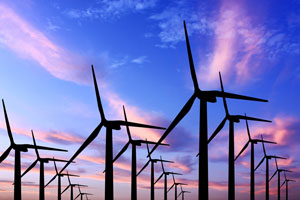Atlantic Wind’s application to build a wind turbine farm in Penn Forest Township has become a heated battle of the experts.
The proposed project would be located between Route 903 and Towamensing Township on property that is being leased from the Bethlehem Water Authority. According to the application, the turbines will be 525 feet high, with rotating blades that have a width of over 300 feet. The site is expected to host 40 of these turbines.
The Bethlehem Water Authority has already signed an agreement with the Nature Conservancy that allows for the turbines’ installation. According to Craig Poff, Director of Business Development for Iberdrola Renewable, the umbrella company for Atlantic Wind, “Penn Forest Township has already determined that it is an appropriate use, because it is permitted by special exception… The zoning hearing is to make sure that we meet the objective standards set forth, things like setbacks, unobtrusive color, things like that.”
The area where the turbines will be located is a pristine forest that is home to white-tailed deer, black bear, red fox, gray squirrel, other small animals, and a large population of reptiles that includes about 20 different varieties of snakes.
Poff stated that the site was chosen because it meets four key elements for wind energy production: wind, access to transmission lines, a market to purchase the energy, and an appropriate area of land. Poff noted that, “We supply clean energy and when wind energy is utilized it offsets the use of fossil fuel…Wind has no emissions and does not contribute to climate change.”
Opposition to Turbines
Dozens of residents have spoken out against the turbines, arguing that it will harm the environment and have negative economic consequences, lowering the value of the surrounding real estate.
Representative Doyle Heffley, R-Carbon, released a statement opposing the project. He cited a report released by the bipartisan Pennsylvania Joint State Government Commission that found that “wind energy projects destroy 42 times as much land resources as natural gas and 22 times that of coal to generate the same amount of power. Windmills also are widely known to cause irreparable harm to birds and other wildlife.”
Expert Opinions
At the zoning hearing, experts testified about the environmental and economic impact.
Real estate appraiser Don Paul Shearer testified that the project could cause homes within a two-mile radius to lose between 20 to 40 percent of their value. Shearer is know for expert testimony on the estimated damages to Alaska after the Exxon Valdez Oil Tanker spill.
Local realtor, Jeff St. Clair, testified that the devaluing could affect more than just the immediately surrounding area, as the decreased price of the homes near the turbines will also cause the prices of the homes nearby to drop.
Richard James, a noise control engineer, said that noise from the turbines would be loud enough to prevent nearby residents from sleeping.
Pamela Dodds, Ph.d., an expert in hydrogeology, has offered testimony about how the turbine project could harm the environment. Dodds testified that the proposed turbine project would deforest at least 292 acres, jeopardizing the exceptional water quality of the nearby Wild Creek.




